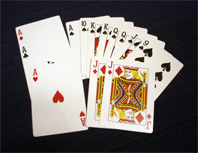

Melding ExampleAs an example, with hearts as trump the bidders meld might consist of the following: For example, a player could not use the same king in both a flush and a royal marriage, but could use the king in both a flush and 80 kings. The following is a list of the possible melds the bidder can thus make and the score for that particular meld:Īs there are two identically ranked cards of each suit, the bidder may be able to create two of the same meld and score individually for both.Ī player may use the same card in melds from two different categories, but may not use the same card in two melds from the same category. The bidder is the only player who may thus meld. The high bidder now places his cards in various groups, face up in the center of the table as melds. After all have seen these cards the high bidder adds them to his hand and is then given the opportunity to meld. Once the "bidder" is determined, this player immediately turns over the three card widow in the center of the table such that all players can see its contents. The two opponents attempt to prevent him from doing this, in a sense becoming temporary partners for the duration of the hand. Once a player becomes the high bidder, he will then attempt to score at least as many points in melds and trick points as he bid. If all three players pass before an opening bid is made this hand is not played and all the cards are shuffled together and the deck passes to the next player in turn to deal. A player is basically bidding the total number of points (or higher) he believes he can score in melds and trick points in the play of the hand. Once there have been two consecutive passes the bidding ends with the high bidder playing the hand as the "bidder". Once a player passes, he may make no further bids in this hand and must pass each time it would be his normal opportunity to bid for the remainder of the bidding round. When bidding a player must bid at least 10 points higher than the last highest bid or pass. The player to the dealers immediate left is the first player to bid. He then deals additional rounds of three card batches to each player until each player has 15 cards.Īfter the players pick up their dealt cards and have examined their hands, the bidding phase of the game begins. After he has distributed the first packet of cards to each player (including himself) he then deals a three card face-down "widow" to the center of the table. The cards are distributed in packets of three face down cards at a time. After the cut, the dealer deals the cards clockwise around the table, starting with the player to his immediate left. The dealer then thoroughly shuffles the cards and offers the deck to the player at his right to cut the deck. The player drawing the second lowest sits to the dealers immediate left and the remaining player sits to that players left. The player drawing the lowest card becomes the first dealer. Variations: I have played this game with up to 5 players, in all cases it's been cut-throat (every man for himself or all against the bidder).To determine the first dealer, each player should cut a card from the deck which has been laid face down on the table. The deal alternates and the game is played to 50. Points are counted as in normal pinochle to determine if the bidder 'made' his bid (one point for each ace, ten and king one for the last trick: total 25). In the play, you always have to (head) beat the highest played card on the trick, if possible, no matter what the lead. Then he proceeded to deal 5 cards only to each of us! Thus the name 5-Card Pinochle.īidding begins with the dealer being under for 3 (dropping the 0 from 30) and the opponent getting one bid only, then the dealer can opt to bid more. He removed the "9's" from the standard 48 card deck leaving just 40 cards. Well I've played several versions of 2-handed Pinochle and found none to my liking so I was skeptical to say the least. Our natural tendency was toward Cribbage or Gin Rummy but he had grabbed the Pinochle deck, saying here's a new one. As 'baby-boomers' we had been playing all types of card games since our childhood, so getting out a deck of cards was quite normal. Contributed by John Sroufe ( ago while in college in Aberdeen, Washington USA, my older brother came to visit.


 0 kommentar(er)
0 kommentar(er)
